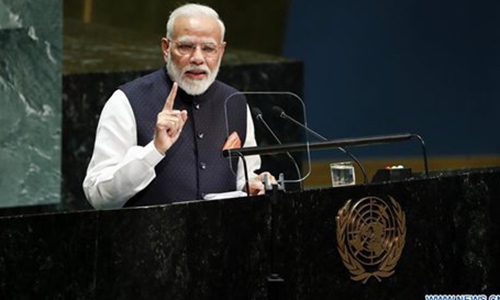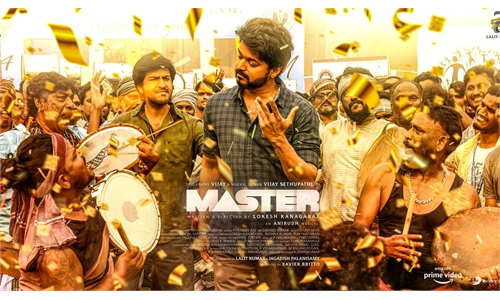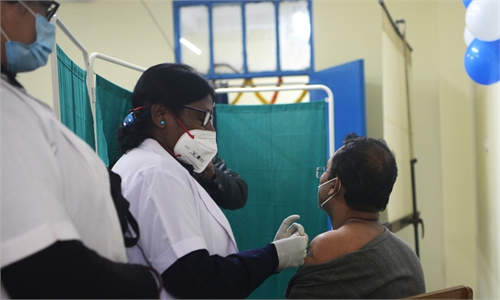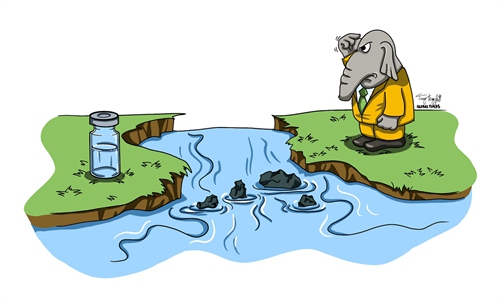
Indian Prime Minister Narendra Modi Photo: Xinhua
India has lately engaged in quite some eye-catching actions. These include the planning to deploy its most advanced nuclear-capable intercontinental ballistic missile Agni-V (which can reach all of Asia), the release of a draft Arctic Policy, and the enhancement of all-round construction at border amid unsettled tensions with China. As the COVID-19 epidemic still rages across the country, India has said it is ready to save humanity with two "Made in India" coronavirus vaccines.All these moves show that under the Modi administration, India's ambition to become a "leading power" from "a country that counts for a great deal" has not been discouraged by the changes at home and abroad since 2020.
During its nearly seven years in power, the Modi government has vigorously promoted the project of national reconstruction and economic reforms at home. On the international stage, India has highlighted its status as a great power and strategic independence, emphasizing the international significance of its rejuvenation and rise and its responsibility as a great world power.
Generally speaking, after a clear strategy is established, one of the core factors that determine the effectiveness of a strategy is the matching degree between a country's capacity and resource consumption as it implements its strategy.
Frankly, the Modi administration has had remarkable achievements during its first term from 2014 to 2019. It saw an average annual economic growth rate of 6.84 percent and a notable increase in international visibility. This was due to favorable international political and economic trends. Stable relations with China also played a positive role in helping India shape the security environment, boost the economy, and attract more foreign investment.
But the overconfidence of Indian leaders has greatly increased especially since Prime Minister Narendra Modi's Bharatiya Janata Party managed overwhelming victories in the 2019 elections. They have unfortunately become arrogant, and acted rashly.
In disregard to opposition from Islamabad and Beijing, New Delhi has unilaterally evoked the special status for India-controlled Kashmir in August 2019. India instigated the bloody Galwan Valley clash. It cracked down on China in areas such as trade and people-to-people exchanges to vent dissatisfaction and cater to India's nationalists and interest groups.
By lashing out at China, India has taken advantage of geopolitical changes - the deterioration in China-US relations in particular - to get closer to the US for political and economic interests. Such moves are aimed at accelerating the growth of India to become a leading power.
In the face of unprecedented changes in one century, decision-makers all over the world are formulating their own policies based on drastic changes brought about by the COVID-19 pandemic. Among them, some are making a correct assessment of the situation and making changes accordingly. Others are trying their best to suppress the emerging powers in order to sustain their established positions. There are also some countries seeking alliances. But in general, most countries cannot make decisions without considering their own national conditions, the available resources, and the priorities of their national agendas.
At present, India has spent too much on its strategic layouts and aggressive foreign policies. This is unwise. If this trend continues in the long term, India might have to face enemies on multiple fronts and slip into a quagmire of strategic overdrafts.
The history of emerging countries shows that strategic aggressiveness is an easy mistake to make. Countries who take this path eventually fail to achieve their goals in either the near or long terms.
Commenting on India's draft Arctic Policy, an article in the Diplomat magazine in early January said that "to what extent India - a country that is much closer to the equator than the North Pole - is able, or even needs to, engage with the Arctic (beyond status-seeking compulsions) is, frankly, not evident at the first glance."
Indian elites should think: At a time when India's economy, society and people's livelihood are deeply impacted by the pandemic, how can it carry out proper diplomacy and make peace with its neighbors? If India cannot control its own epidemic well, how can it convince people around the world that Indian vaccines are trustworthy and should be used globally?
Should India continue to rely on international anti-China forces and engage in a zero-sum game with China, then China-India relations will not improve. India's ties with traditional friends, such as Russia, will be also affected. If so, how can India be a world-class leading power?
The author is director of the research department at the National Strategy Institute at Tsinghua University. opinion@globaltimes.com.cn



